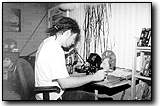![]()
![[ ARTS
]](/images/fall97/artsublogo.gif)
By Laura Bond
Arizona Daily Wildcat April 16, 1998
Screen Savers
![[Picture]](11_2_i.gif)
Photo courtesy of Agit Jack Film Ted Parks plays Durante in Robert Loomis' feature film, "Dog Years." |
When most people think of attractions in Tucson, a few familiar images spring
immediately to mind. Old Tucson. The Mission San Xavier del Bac. The Saguaro
National Monument, and a seemingly endless string of parades, ranging from
those put on by the Tucson Molé Eaters Appreciation Society to nearly
pagan celebrations honoring the chili pepper.
Beginning tonight, however, Tucson will play happy host to an event that has little to do with cowboys, cacti or any of the other icons associated with life in the desert. Now in its seventh year, The Arizona International Film Festival, which will dominate nearly every square inch of many area film venues through April 26, is one event which has placed Tucson on the cultural map and gained the attention of filmmakers around the world.
We're talking movies, kids. Lots and lots of movies. Back to back screenings will run until the wee-hours of the festival mornings, providing Tucsonans a rare chance to view more than 100 films from around the globe: weird films, bizarre films, black and white films; dramas, comedies, documentaries - you name it, the festival's got it. With 11 World Premiers, 2 U.S. Premiers and 44 Arizona Premiers, these are films you haven't seen in a theater near you and probably won't have a chance to see again anytime soon.

Arizona Daily Wildcat Jeffrey Bertiger edits "Far from the Tree" |
This year's festival is poised to be the most thorough and innovative yet, with a number of related events taking place beyond the darkened aisles of participating screening spaces. A series of industry and production related workshops will take place at Christine's Motion Picture, and Community Access Tucson Channel 64 will screen "Independent Visions," selected festival work, every night from Sunday to Saturday.
New additions to this year's festival include a thematic emphasis on the work of international filmmakers; this year, Irish cinema is the focus, with 21 Irish-produced films, ranging from shorts to features to documentaries.
"We really wanted to pull in the international community, to establish a link there," said festival director Giulio Scalinger. "There are lots of independents from other countries looking for venues, so we decided just to focus on one country a year."
Considering the worldwide attention currently being paid to the peace agreements in Northern Ireland, Scalinger describes the festival's timing as "the luck of the Irish."
Also new is a competitive component, The Reel Frontier Film and Video series, in which 64 finalists will compete for awards in five categories: features, short films, documentary, animation and experimental. Among the finalists are 11 World Premiers and works from 13 Arizona filmmakers, 10 of which are from UA students, faculty or alumni. The winners will be announced in a special ceremony at The Screening Room Saturday, April 25 at 7 p.m.

Arizona Daily Wildcat "Mommie Queerest" by Beverly Seckinger. |
While the variety of screenings and film related activities is impressive, The Arizona International Film Festival is still relatively small compared to others in terms of industry importance. It ain't Sundance. Or Cannes. For those involved with festival planning, that's just as well.
"Every year our attendance has grown by 10 percent," said Scalinger. "It's now easier to get films; we're getting more recognition, but we're not trying to be Sundance. The thing about big festivals is that they've reached their peak. One hundred of 2,000 films are accepted, it's oversaturated, and a lot of good films are not selected."
Unlike its Park City counterpart, Tucson's festival is more concerned with providing independent producers with an opportunity to screen their work and see the work of their artistic peers, rather than creating an industry environment where studio scouts scramble to sign contracts with the most buzzed-about young directors. Chances are, the cafes which line the downtown streets near the Screening Room, the heart of Festival activities, won't be brimming over with sunglass-wearing starlets or fat-cat producers puffing on cigars.
"The first thing many people ask me is 'What stars are coming?'" said Scalinger. "If a star does want to come in, aggressively promoting a feature, we won't turn them away, but our principal goal is to provide a venue for independents, from this country and others."
Through the inclusion of works from Arizona filmmakers and outreach activities, the festival also carries a local flavor, a fact that speaks to the festival organizers' commitment to enhancing the Tucson community.
"They (the festival planners) did include a lot of local people, which they didn't have to do," said UA media arts graduate Mike Plante, whose series of short film and video works "What Sort of Man Watches Short Films?" screens at The Grill Thursday, April 23. "I really don't know of any other festivals that make an effort to screen local works. I appreciate that."
Plante's sentiment is echoed by UA graduate Michael Toubassi, whose short, "Number 12," is a finalist in the Reel Frontier Film and Video Competition. "The festival is kind of like a music convention where no radio people show up; without much industry presence, it's really still just a great chance for locals to see the work of other locals."

Arizona Daily Wildcat Yvonne Huff plays Anne in Rob Sabal's short film, "Molt!" |
Other community events include screenings of selected festival films at local high schools with large populations of Chicano students, including Pueblo High and Sunnyside High. "Cuba 15" and "Low Y Cool," by local filmmaker Marianne Dissard, are two of the films to be screened at the schools, as both focus on social and cultural issues within the Chicano community. According to Scalinger, the high school screenings will aim to inspire Chicano students with dreams of becoming involved with the film industry.
"We want them to know that if they wanted to do this, they could," he said. "Chicanos really have few models to look at in film. They need to know that if you're interested in making films, there are ways."
Festival passes range from $20 to $125, and single admission tickets to specific screenings are $5 each. Check the official Web site of the Arizona International Film Festival at www.azstarnet.com/~azmac for complete information on screening times and locations, or phone 628-1737 or 622-2262 for more information.



